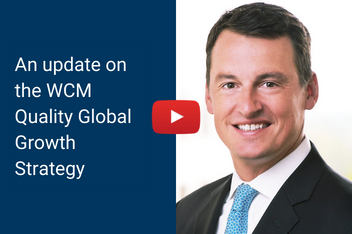A key focus of the WCM Quality Global Growth portfolio is to find quality global companies with durable, strengthening economic moats and corporate cultures aligned to this growth. An example of a company that demonstrates these characteristics is Nike.
In this update, Ryan Quinn, Client Portfolio Manager at WCM Investment Management (WCM) outlines why WCM believes Nike’s moat is expanding, and how its culture of ‘putting the athlete first’ has created a powerhouse brand.
Tom Hickey (TH): Hello, and welcome to this “Stock In Focus” update, with WCM Investment Management. Joining me today from WCM, is Ryan Quinn. How are you, Ryan?
Ryan Quinn (RQ): I’m well, Tom, how you?
TH: Very well, thank you. Today, we are talking about a company, a small company called Nike. Now that’s one of the biggest apparel companies and most well-known brands in the world. Can you give us an idea of what attracted you to that company?
RQ: Absolutely. Nike is a business that almost everyone knows across the world, thanks to its high-performance offerings across a really wide variety of sports. The company’s scale and reputation make it a force to be reckoned with, within the athletic footwear and apparel markets, for both men and women. When you’re in the market for new Jordans, fresh trainers as you may call them, or boots for the football field, odds are you’re considering some Nike models.
TH: What is the competitive advantage like and what are the main competitive advantages?
RQ: An obvious place to start is the brand. Nike’s brand is really a significant source of its strength. It creates a wide moat, but as we know, wide moats aren’t enough. It’s a company that we describe as a high-quality compounder, and these businesses usually continually improve and can be owned for a very long time. I mean, Nike in its past has had its ups and downs, but rather than sitting back on its brand history, the company typically comes out swinging when it’s challenged.
So, let’s get back to the question of why we own Nike now. And we’ve identified a few key factors in its evolution that we believe will encourage already a strong competitive advantage to get stronger. Number one, they pulled out of third-party providers like amazon.com. They were concerned with the counterfeiting that was happening with their shoes online so they pulled back from Amazon.
Also, they have pulled back from 30,000 undifferentiated wholesale locations, all with the goal of having more control over their brand. And that desire to control their brand more, has led to a focus on going directly to the consumer. They want to make sure that: the experience on their online website is excellent; that they offer the products that the consumer wants and; they want to cut out the middleman almost completely. This is good for not only the strength of the brand, but also long-term for margins.
Finally another large long-term tailwind that we see, and we’re really excited about, is China related. Nike is very well positioned in the country due to increased popularity of athletic activity, acceptance of athleisure as a style choice, and the strong and growing popularity of basketball among other sports inside the country.
TH: What is your view on the culture within Nike and how does that support those advantages you just listed?
RQ: Nike’s culture really centres around activity and is one that puts the athlete and the sport first. It’s more about the function of what they produce. It wants to be the industry leader in every piece that they put out. It’s a culture that’s not afraid to take a stand and is frequently supporting social movements through bold actions and very high visibility.
We believe Nike isn’t just a platform to put out high quality athletic gear. It really strives for both business and social excellence.
TH: Ryan, thanks for your time.
RQ: Cheers.
[sc name="stock-in-focus-webinar-disclaimer-qgg"]









